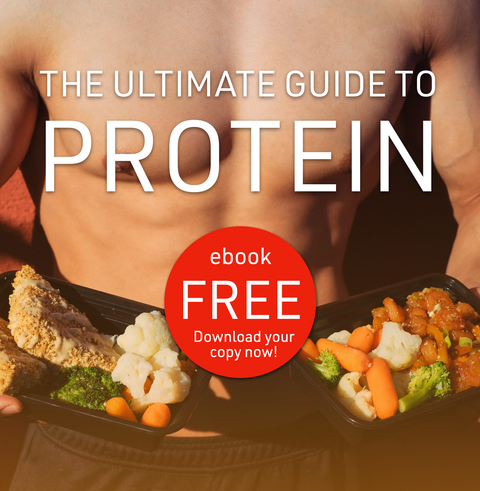As we get older, maintaining one’s muscle mass, strength, and overall health becomes more challenging – just one of the crap side effects of ageing. For those of us over 50 engaging in strength training and fitness programs, protein plays an essential role in muscle repair, growth, and recovery. But, while protein is crucial, it’s only one part of a story…forget diets, a well-rounded diet including carbohydrates, healthy fats, vitamins, and minerals is equally important for optimal nutrition to enable performance and longevity.
So why does protein matter so much for the over 50s?
Quite simply, protein is the building block of muscle tissue. As we get older, sarcopenia (age-related muscle loss) accelerates, so it’s important to counteract it, thus making it essential to consume sufficient protein to maintain strength, mobility, and, ultimately, your independence. Strength training is great to help counteract this muscle decline, but without adequate protein, muscle repair and growth are going to be compromised, so it’s vital to support this as much as possible.
Five key benefits of protein for maintaining your strength & fitness:
✅ It supports muscle repair & growth – this is essential after workouts to rebuild muscle fibres and improve strength
✅ It prevents muscle loss – by helping to slow down sarcopenia, maintaining mobility and independence
✅ It boosts your metabolism – and building higher muscle mass leads to a better metabolic rate, supporting weight management
✅ It improves your recovery – by reducing post-exercise soreness and supports faster muscle recovery
✅ It supports your bone health – when combined with resistance training, protein helps maintain bone density, reducing the risk of osteoporosis (brittle bone disease)
All sounds good right – so just how much protein do I need?
For individuals over 50 engaging in regular strength training, a higher protein intake is recommended:
- Look to have around 1.2 - 2.0g of protein per kg of body weight per day…ideal for muscle maintenance and growth
- Look to spread your protein intake evenly across meals to maximize muscle protein synthesis…too much in one go will literally be passed straight through your body
What are the best sources of protein?
- Animal-based options: look for lean cuts of chicken, turkey and beef. Eggs, fish, Greek yoghurt and cottage cheese are also great sources
- Plant-based options: we’re we’re talking about stuff like lentils, beans, tofu, quinoa, nuts, and seeds
- Supplements: ideally you’ll get most, if not all your protein from food, however in the event what you can’t whey or plant-based protein powders can help meet daily protein targets, particularly post-workout
But don’t forget, protein is only a third of the story…
While protein is crucial, the other ‘big two’ shouldn’t (and can’t) be forgotten: carbohydrates and fats are often overlooked but they play a major role in energy production, recovery, and your overall health.
Carbs – fuel for the engine
Carbs provide the primary source of energy for your training sessions. Without them, performance and endurance can suffer and you can feel sluggish or tired.
- Best places to find them: whole grains, brown rice, oats, quinoa, sweet potatoes, fruits, and veg
- Post-workout carbs help replenish glycogen stores, ensuring better recovery and sustained energy
Healthy fats – vital for your joints and hormones
Often seen as the ‘enemy’ (probably as the word ‘fat’ conjures up so many negative images) but fats – or to be more precise, healthy fats - play a key role in hormone production, joint lubrication, and inflammation control—all critical for aging bodies and keeping them in tune.
- Best places to find them: avocados, olive oil, nuts, seeds, oily fish (salmon, mackerel), and flaxseeds
- Omega-3 fatty acids (found in fatty fish and flaxseeds) are great to support joint health and reduce inflammation, which is beneficial for those lifting weights regularly
And don’t forget your vitamins and minerals too!
To fully support muscle growth, recovery and longevity, incorporating key micronutrients into your daily diet is essential. By this, we mean stuff like the following:
- Calcium & Vitamin D – these strengthen bones and help to prevent osteoporosis. They can be found in dairy, leafy greens, and from sunlight exposure
- Magnesium – one of the most important minerals in terms of it direct affect as well as engaging the effectiveness of other vitamins and minerals, it supports muscle function, reduces cramps, and aids recovery (found in nuts, seeds, and leafy greens). It’s also great for supporting better sleep as well
- B Vitamins – these are great for improving energy production and support metabolism. They can be found in lean meats, whole grains, and eggs
- Iron – Essential for oxygen transport and reducing fatigue. Best sources are red meat, beans, and spinach
Like most things in life, it’s all about balance
For those of you over 50 engaging in strength training and fitness, firstly, good for you: you’re in the right direction for a fitter, longer, healthier and likely happier life. As a key part of this, protein is a cornerstone of muscle maintenance and growth—but it’s no solo act – it’s just part of the story. It’s important to have a balanced diet including healthy carbs, fats, and essential vitamins/minerals provides the energy, recovery, and long-term health benefits needed to train effectively and stay strong as we age.
But, by prioritising quality nutrition alongside a structured fitness plan, you can certainly enhance your performance, prevent muscle loss, and maintain vitality well into later years. So, stay consistent, fuel your body wisely, and enjoy the benefits of lifelong strength and health! 💪✨
Want to know more about optimum nutrition when it comes to protein? Of course you do, so why not download our 100% FREE guide to protein here? It’s packed full of advice, suggestions, recommendations and tasty recipes, too. All yours with no strings attached. To access your copy, just click here.




